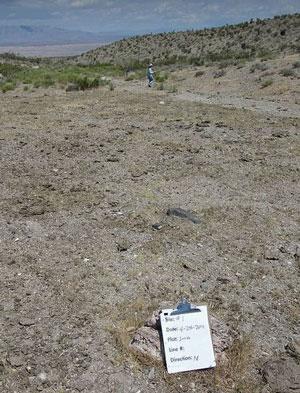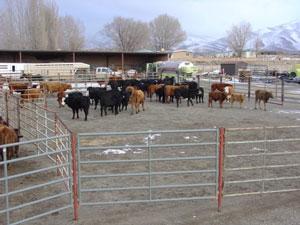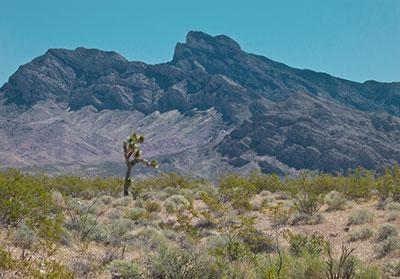In a situation that reads like a bad plot from an old western movie, officials with the Bureau of Land Management and Lake Mead National Recreation Area are hoping for a peaceful resolution of a cattle trespass dispute with a Nevada rancher that has lasted more than 20 years. It's a tense and tricky situation.
What's going on the desert northeast of Las Vegas?
The answer goes all the way back to the 1800s, when parts of the West were settled by ranchers who controlled vast areas of open range simply by securing relatively small tracts that included scarce and essential water sources'and then grazing their livestock on the adjoining land.
As more settlers looking for their own land arrived, open range was often overgrazed, disputes arose, and the resulting conflicts provided fodder for many a western novel and movie. Order was eventually secured by a combination of land surveys to define property lines, systems such as the Homestead Act to allow orderly transfer of public land to private ownership, and institutions such as courts and law enforcement to keep the peace.
Grazing Leases and the Bureau of Land Management
Public land which was not legally converted into private ownership remained in the public domain, and some ranchers continue to use public property to supplement their private range. Much of that public land is being managed today by the U. S. Bureau of Land Management (BLM), and that agency faces a challenging and often controversial task: "to manage and conserve the public lands for the use and enjoyment of present and future generations under our mandate of multiple-use and sustained yield."

The BLM manages grazing permits on public land all across the West. BLM photo.
One of those "multiple uses" is grazing, and a dispute between a rancher named Cliven Bundy and the BLM over the use of land in southern Nevada has lasted for more than 20 years. The former grazing lease, known as the Bunkerville allotment, includes public land managed by both the BLM and National Park Service at Lake Mead National Recreation Area, with the BLM handling grazing issues for the NPS.
"Multiple Use" Can Lead to Conflicts
A mandate to manage large areas of land for such diverse uses as grazing, wildlife, recreation, mining, timber and energy development often leads to conflicts, and that's the case on the Bunkerville allotment.
Beginning in 1993, the BLM informed Mr. Bundy about limits on the number of cattle he could graze on the allotment in order to meet regulations to protect wildlife, particularly a threatened species, the desert tortoise. Mr. Bundy refused to accept the limits and stopped paying the required fees for his grazing permit ... but continued to run his cattle on the property.
The BLM subsequently cancelled the grazing permit, and in 1997, Clarke County, Nevada, purchased all the active grazing permits in the area to conserve them for wildlife needs. A tentative proposal was made to Mr. Bundy to compensate him for any stock water rights or range improvements he might have in his former allotment. He rejected the offer...and continued to run his cattle.
Failed Negotiations Lead To Court Cases
After further attempts to negotiate with Mr. Bundy failed, a series of court cases that extended up to the Ninth Circuit Court of Appeals upheld an injunction which permanently enjoined Mr. Bundy from grazing cattle on the Bunkerville allotment, and ordered him to remove all trespass cattle. He refused, despite notices that the livestock would be subject to impoundment and removal if they remained.
While the legal wrangling continued, the number of cattle in the area continued to grow. In 1999, the BLM was able to document 51 head of Bundy cattle on federal range in the allotment; by 2011, over 900 cattle were counted by a helicopter survey of the rugged terrain.
Mr. Bundy apparently concedes that he has never owned any of the land in question, but disputes the BLM's jurisdiction; he contends he has the right to continue to use the property, since his family has been doing so since the 1880s.

Damage to soil and vegetation from concentrated use by trespass cattle in the former Bunkerville Allotment. BLM photo.
The BLM Still Manages Lots of Grazing Permits
The BLM has taken pains to point out that it is not anti-grazing, noting that it "administers approximately 18,000 grazing permits and leases on 157 million acres of public lands..."Ranching continues throughout Southern Nevada on public and private lands," the agency notes. "BLM currently has three active grazing allotments on more than 100,000 acres of public lands in Southern Nevada."
Kirsten Cannon, spokeswoman for the Nevada BLM office in Reno, says, 'His cattle have been illegally trespassing on federal land for two decades and it's just unfair for those who ranch in compliance,' she said. 'We made repeated attempts to resolve this. The courts have ordered him to move his cattle. Now we've reached the last resort, which is impoundment.'
You can read a summary of the history of the dispute at this BLM link, and the agency, under increasing pressure from other local landowners and conservation groups, has decided it's time to remove the cattle and resolve the issue.
There's no doubt that Mr. Bundy has flouted the legal system for years, but you might wonder what else is at stake in this situation.
A Long List of Problems Caused by Trespass Livestock
The BLM cites a long list of problems caused by Mr. Bundy's cattle. Among the issues are damage by the cattle to springs and vegetation on public land and trampling of artifacts at cultural sites. Crops on adjacent private property have been damaged by foraging livestock, and residents of the communities of Bunkerville and Mesquite have complained about the impact of trespass cattle on city facilities, including the Mesquite Heritage Community Garden and the Mesquite golf course.
If you've even been around cattle which aren't accustomed to being "worked" regularly by humans, you'll understand the safety concerns for visitors and employees using the BLM and park lands in question. According to the BLM, "a State of Nevada employee at the Overton Wildlife Refuge has been attacked by a Bundy bull, and a feral cow was hit by an automobile within Lake Mead National Recreation Area. Cattle are frequently seen on public roads, including State Route 170, and pose a danger to vehicles and to members of the public traveling on public roads."
There have been other economic costs from the trespass livestock. The Nevada State Department of Wildlife has had to build extensive fences to protect state and federal lands in the Overton Wildlife Refuge from the cattle. The Walton Family Foundation had offered $400,000 for a matching grant to restore wildlife habitat in the area, but has withdrawn the funds until the trespass cattle have been removed. It's a reasonable decision; restoration efforts would be a waste of money as long as the cattle continue to roam and damage the area.
Two Decades of Waiting May Be Coming to an End
So, what's next?

These trespass cattle, removed off public land in northern Nevada, are being cared for until they are claimed and fines/impoundment fees are paid. BLM photo.
According to a statement from Lake Mead National Recreation Area, "The BLM and NPS have made repeated attempts to resolve this matter administratively and judicially. Impoundment of cattle illegally grazing on public lands is an option of last resort. The BLM and NPS are working closely with local, state and federal officials to ensure the gather of unauthorized cattle occurs in a safe and orderly manner."
During what will undoubtedly be a challenging roundup, the area involved will be closed to public use from March 27 through May 12. The park website notes, "Only a small portion of the northern and eastern part of the park will be temporarily closed, and Echo Bay, Stewarts Point, Redstone and the hot springs along Northshore Road remain open." You can view a map of the area within the park involved in the closure at this link.
Bundy's Response
So, what's Mr. Bundy's reaction to the latest developments? That's a cause for concern, and at least part of the reason for the closure of the area to the public during the impending roundup.
A previous roundup scheduled for 2012 was cancelled due to fears of a violent confrontation with Bundy, and the BLM opted for one more try at a solution in the courts. That cancellation in turn brought threats of a lawsuit against the BLM from an environmental group, for failure to enforce court orders to remove the livestock. In 2013, the BLM prevailed once again in court.
Bundy's response to the numerous court orders to remove his cattle has been succinct. "At first I said, 'No,'" he told The Los Angeles Times last year, "Then I said, 'Hell, no.'"
"I've got to protect my property," Bundy told the Times. "If people come to monkey with what's mine, I'll call the county sheriff. If that don't work, I'll gather my friends and kids and we'll try to stop it. I abide by all state laws. But I abide by almost zero federal laws."
The County Sheriff Urges A Peaceful Solution
It doesn't appear the county sheriff plans to intervene on the Bundys' behalf. According to Carol Bundy, the rancher's wife, 'We want him to step in and tell these federal characters that 'This is Clark County, Nevada, land and you have go through me to get these cattle.' But we have not heard a word.'
For his part, Clark County Sheriff Doug Gillespie understands the days of the 19th century range wars are long past. The Las Vegas Review-Journal quoted Gillespie as saying: 'I'm always concerned when there are situations like this where there is so much emotion. I hope calmer heads will prevail like they normally do. You're talking about rounding up cattle. You have to keep that in perspective. No drop of human blood is worth spilling over any cow, in my opinion.'
He absolutely right. Let's hope everyone else involved in this situation agrees.




Comments
"The fact that progressive courts have been among those that ignored that purpose may make it law but it doesn't change the original intent nor the fact that the further we have moved from that orginal intent, the lesser a nation we have become."
I'm not sure I'd classify John Marshall's court as a progressive one. In any event, different framers of the Constitution had different intents, and when the Constitution was ratified in each state, people there had different intents and interpretations as well. The Constitution was never the work of one man, and it was never given force of law by one man, which is why the whole idea of pointing to a singular original intent is flawed.
Regardless, "implied powers" was upheld by the Supreme Court, led by founder John Marshall, in 1816, so I guess we moved away from the original intent 198 years ago (along with moving away from the original intent of slavery and 3/5ths personhood 149 years ago), and frankly I think the country has become a much greater nation in the past two hundred years. Obviously others are entitled to disagree, and I welcome that disagreement, because it's part of what makes America great.
"Rick B, your statement about every President lies and just go with the one that does what you want really is chilling to me. Third world to my way of thinking."
Trailadvocate, I don't think that's emblematic of third world thinking, it's just a recognition that humans are flawed and our government is composed of humans who seek power, and in seeking power they're inevitably going to lie. Obama has lied, at times. So has Bush, so did Reagan, so did Roosevelt (both of them), so did Lincoln, so did Buchanan, so did Adams and even Washington. Rose-colored glasses pointed toward the past notwithstanding, I don't see a great degradation in the quality of our country (I think America is a pretty great country) or our leadership overall.
I don't agree with everything the current President has done or said, but I did vote for him because I think he was the better alternative and because his stances on various issues aligned more closely with my own than the alternative. I disagree with him on other stuff and am proud to oppose him in those instances, and I try to keep my mind open about such things. But I think you'll find not many people are going to be persuaded by you when you just seem filled with bottomless invective and don't make a nuanced and constructive case, instead just complaining that everything is lies and hatred and subverting the law.
Yes, and that is not what you claimed I said. What I said was the was unanimity in the belief that the central government should be limited. If you have evidence that Hamilton believed it should be unlimited, please show us.
Also, if you have any evidence that the drafters of the Constitution didn't believe the enumerated powers were the limit at the time the Constitution was written, as Madison so proclaimed, please produce them. I certainly can't find anything in the Federalist papers that refute Madison's declaration in Federalist 41.
On that we must disagree. Hamilton's option of a more powerful central government was rejected. Madison's plan of limited government was accepted. The reality today is that most people either don't recognize or want to ignore that our original Constitution was written with the purpose of limiting the powers of the central government.
The fact that progressive courts have been among those that ignored that purpose may make it law but it doesn't change the original intent nor the fact that the further we have moved from that orginal intent, the lesser a nation we have become.
Only to those that don't want to live by it. There was plenty of public discussion at the time. While there was lots of discussion of what those powers should be, nowhere does any Federalist refute Madison's declaration that the enumerated powers are the only powers.
elhelred, thank you for your measured and informative posts. I am certainly not an expert in any of this, historians spend a lifetime studying these issues. But what little I think I know mirrors your thoughts.
Thanks, too, ethelred, for pointing out what is (otherwise) widely acknowledged--that a hermeneutical reading of the Constitution is far from unproblematic.
ecbuck, you say "The reality today is that most people either don't recognize or want to ignore that our original Constitution was written with the purpose of limiting the powers of the central government."
James Madison, on the other hand, told Thomas Jefferson the opposite: "The evils suffered and feared from weakness in Government have turned the attention more toward the means of strengthening the government than of narrowing it."
You go on to say: "Also, if you have any evidence that the drafters of the Constitution didn't believe the enumerated powers were the limit at the time the Constitution was written, as Madison so proclaimed, please produce them. I certainly can't find anything in the Federalist papers that refute Madison's declaration in Federalist 41."
The Articles of Confederation stated that the federal government did not have any power "which is not by this Confederation expressly delegated to the United States." The Constitution changed that around by saying that Congress can "make all laws which shall be necessary and proper for carrying into execution" its powers. That is the clause which is cited for the understanding that the federal government has implied powers. If the drafters of the Constitution had wanted to limit Congress to only those powers which they had enumerated, surely they would have left in that same language that was used in the Articles.
Regretfully, I cannot offer you evidence, other than a logical reading of the changes between our two governmental texts, that the drafters at the time the Constitution was written recognized that the necessary and proper clause would give Congress implied powers above and beyond its enumerated powers, because the deliberations of the convention were bound by an oath of secrecy and no full accounting of their deliberations has ever been made available because of that. But some of the drafters of the Constitution did speak out against the clause (Edmund Randolph and Elbridge Gerry, for example).
I can tell you that even before the Constitution was ratified, plenty of founders recognized that Necessary and Proper would give Congress powers beyond those enumerated. Patrick Henry said during the Virginia Ratifying Convention that the clause would lead to limitless federal power. Virginia ratified anyway. If Anti-Federalists at the time recognized the meaning of those words and opposed the Constitution on those grounds, then surely the people drafting the Constitution recognized that the words could be interpreted in such a way as well.
James Wilson, who wrote the Necessary and Proper clause during the drafting of the Constitution and was later one of the original Supreme Court justices, stated during the Pennsylvania Ratifying Convention that Henry's interpretation was extreme in that the clause would not lead to limitless power, but that it DID give Congress powers beyond those specifically enumerated.
According to The Heritage Foundation, Wilson said the Clause "authorizes what is 'necessary to render effectual the particular powers that are granted.' Congress thus can make laws about something otherwise outside the enumerated powers, insofar as those laws are 'necessary and proper' to effectuate federal policy for something within an enumerated power. Although not independently valid under another enumerated power, such laws are supported by this clause to the extent that they constitute a means by which federal policy can be executed under an enumerated power."
This is the interpretation that Hamilton used when he argued that Congress can pass laws exercising powers that are not expressly enumerated within the Constitution, if Congress feels (and the courts agree) that these things can be in some way related to the powers that are enumerated. The Constitution didn't give Congress the power to create a National Bank, for example, but a National Bank could be interpreted as necessary for carrying out Congress's power to regulate trade or create currency, so the power to create a National Bank is therefore implied. The Supreme Court unamimously held this to be the correct view in 1816.
We also know that the drafters of the Constitution believed the federal government had more powers than those enumerated because in addition to enumerating specific powers, they also list specific things that Congress CANNOT do. But if the drafters believed that Congress had no powers other than what they expressly gave it (even though they removed the clause saying that Congress had no powers other than those expressly given it in the Articles), why say what Congress can't do? The enumerated powers don't say that Congress has the power to pass bills of attainder, but the Constitution still specifies that Congress can't pass bills of attainder. This was because the drafters recognized that Congress had the power to do things other than those expressly listed. And the Supreme Court (progressive or otherwise) has upheld this view, too.
This has been the structure of our country for 198 years since McCulloch v. Maryland. If America has been in decline for 200 years, so be it. If you want to claim we've lost our way and have been on the wrong track for 200 years, so be it. Me, I like the way America works, I like our system of government, and I think (though I can certainly point to some problems) that we're doing pretty well. I think America is a better place now than it was 200 years ago, and I think it's a better place than it was 100 years ago, and I think it is a better place than it was 50 years ago.
And I think part of what makes the country better is our evolving concept of protecting natural resources and public lands; I like that we've taken the idea of National Parks as first created under Ulysses Grant and later expanded under Teddy Roosevelt and have done even more with that, and have continued to look for new ways to preserve great parts of America for future generations. Part of that means not allowing rogue individuals to despoil public lands because they feel the laws do not apply to them.
rmackie - thanks for your comment in response to my remark that "there's plenty of reason for "dissatisfaction with our bureaucrats and elected leaders..."
You're absolutely correct that all of our leaders are not cut from the same cloth, and I didn't intend to suggest I was making a blanket indictment.
Thank you ethelred for sharing your knowledge with us. I've learned a lot and it's certainly amusing to see our slippery friend trying to play another round of Calvinball with someone who seems to have been able to put him into a dither.
That becomes very clear in such exchanges as: "They did however, agree unanimously that the power of the national government be limited . . "
And: "Nope, never said that."
Sounds a lot like a politician at work.